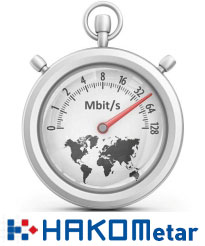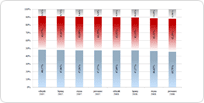Hakom - Croatian Post and Electronic Communications Agency
e-Agency
Users:
Cost Estimator
The Holder of Framework Programme
GIS portal
Privacy calculator
Application ''Quiz''
Market survey
HAKOM at the International Conference on Fiber Optic Technologies (FiberWeek 2016)
NEWSHAKOM's experts actively participated in the International Conference held on the island of Brač and two presentations were held during the first two days of the conference.
During the first day of the conference HAKOM participated and held two presentations which were followed by a roundtable discussion. The main discussion topic was "The Broadband Access Development in Croatia, Regulation, Standardization, Planning/Projecting, Financing, Roll-out, Management and Service“
The presentation held by Hrvoje Perica, Communication Networks and Services Department Manager and Josip Šajnović, Senior Infrastructure Expert was on "The role of the local governments in the development of fast and ultra-fast Internet access using the EU funds" which clarified the following topics :” Status of broadband Internet access in Croatia , State and roll-outs of optical access networks in Croatia, Strategy for the Development of Broadband in the Republic of Croatia in period 2016 – 2020, National Framework Programme for the Development of Broadband Infrastructure in Areas Lacking Sufficient Commercial Interest for Investments, Funds available for the development of broadband infrastructure, Local self-government units as competent authorities for the development of broadband infrastructure and HAKOM’s measures to promote the development of broadband infrastructure by local self-government units.”
The second presentation entitled "Effective use of available space in infrastructures and reducing the construction costs of broadband access network“ was held by Lidija Antonić, Senior Legal Affairs Expert and Vladimir Žuti, Senior Infrastructure Expert .The presentation clarified basic provisions of the “Directive on measures to reduce the cost of deploying high-speed electronic communications network “, as well as the coordination of construction works and the issuance of construction permits and approvals for the construction. In addition, several issues were elaborated such as the impact of measures provided by the provisions of the” Ordinance on the manner and conditions for access and shared use of the electronic communications infrastructure and other associated equipment in the project implementation financed by the EU funds, the reimbursement of the construction costs of broadband networks financed by public funds and the impact on reducing the costs by using new technologies prescribed by the Ordinance.
For more information on the Conference please check the following link http://www.fiberweek.info
# # #
For additional information please contact:
Croatian Regulatory Authority for Network Industries (HAKOM)
Roberta Frangeša Mihanovića 9
10110 Zagreb, Croatia
Tel. + 385 (0) 1 700 70 07
Fax + 385 (0)1 700 70 70
Media inquiries can be submitted online using HAKOM’s official website:
Registration required.
ABOUT HAKOM: HAKOM (www.hakom.hr) - Croatian Regulatory Authority for Network Industries – ensures preconditions for a fair market competition, stable growth and environment for innovations in the electronic communications and postal services market. HAKOM protects users’ interests and the possibility of choice among various communications and postal services at affordable prices, defines sustainable competitive conditions for operators and service providers under fair conditions for return on investment, and provides support to economic growth, public services and the quality of life in the Republic of Croatia by using modern technologies. HAKOM’ strategic goals are: to promote regulation of the electronic communications and postal services market, to support growth of investments and innovations in the electronic communications and postal services market, to provide efficient use of limited resources, to accelerate the growth of broadband products and services, to provide affordable offers of communications and postal services, to provide protection and informing of users, to build an efficient and comprehensive information system, to define and implement efficient processes, and to acquire multi-disciplinary competencies in market regulation.












